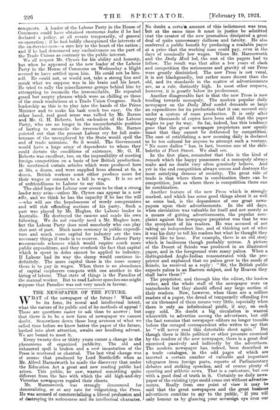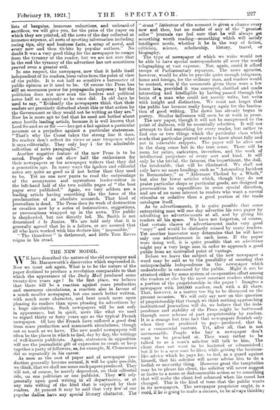THE NEWSPAPER OF THE FUTURE.
Wwill HAT of the newspaper of the future ? What wi be its form, its moral and intellectual intent, what the nature of its public and of its methods of appeal ? Those are questions easier to ask than to answer ; but that there is to be a new form of newspaper we cannot doubt. Somewhere down those long avenues of what we called time before we knew better the paper of the future, hushed into alert attention, awaits our headlong advent. We are bound to meet it.
Every twenty-five or thirty years comes a change in the phenomena of organized publicity. The old and exhausted spell is broken and a new incantation of the Press is muttered or chanted. The last vital change was of course that produced by Lord Northcliffe when as Mr. Alfred Harmsworth he made the discovery that under the Education Act a great and new reading public had arisen. This public, he saw, wanted something quite different from the fare with which the old high-and-dry Victorian newspapers regaled their clients. Mr.Harmsworth was strongly denounced for demoralizing, or at any rate for vulgarizing, the Press. He was accused of commercializing a liberal profession and of destroying its seriousness and its intellectual character. No doubt a certain amount of this indictment was true, but at the same time it must in justice be admitted that the creator of the new journalism dissipated a great deal of quite unnecessary dullness and fatuity. He also conferred a public benefit by producing a readable paper at a price that the working man could pay, even in the days of nominally low wages. Where Mr. Harmsworth and the Daily Mail led, the rest of the papers had to follow. The result was that after a few years of clash and competition the seriousness and gravity of our Press were greatly diminished. The new Press is not venal, it is not blackguardly, but rather more decent than the old, and its standards in the matter of advertisements are, as a rule, distinctly high. In most other respects, however, it is greatly below its predecessor.
Another disagreeable fact is that the new Press is now tending towards monopoly. The modern popular daily newspaper on the Daily Mail model demands so large an expenditure for its production that it can succeed only under a system of mass production. It is only after many thousands of copies have been sold that the paper begins to pay its way. So far, indeed, has this tendency gone that the great newspaper proprietors now openly boast that they cannot be dethroned by competition. The cost of establishing a new morning daily is declared to be too colossal for anyone to attempt such a venture. " No more dailies " has, in fact, become one of the shib- boleths of Fleet Street. We shall see.
In the first place, remember that this is the kind of remark which the happy possessors of a monopoly always make and no doubt very often genuinely believe. And yet in the end competition always comes and destroys the most satisfyieg dreams of security. The great rule of trade is that where there is combination there can be competition, just as where there is competition there can be combination.
Another feature of the new Press which is strongly marked, and which has some good things about it as well as some bad, is the dependence of our great news- papers upon their advertisements. In the old days, when circulation was valuable for itself and not merely as a means of getting advertisements, the popular com- plaint against the newspaper proprietor was that he was the sycophant of his readers. He was accused of not taking an independent line, and of thinking not of what it was his duty to tell his readers but what he thought they would like to hear. For example, there is an old story which is luciferous though probably untrue. A picture of the Desert of Scinde was produced in an illustrated paper, and in the foreground were many palms. When a distinguished Anglo-Indian remonstrated with the pro- prietor and explained that no palms grew in the sands of Scinde, he received as a reply : " Sir, the British public expects palms in an Eastern subject, and by Heaven they shall have them !"
The proprietor, and through him the editor, the leader. writer, and the whole staff of the newspaper were on tenterhooks lest they should offend any large section of their readers. Now, however, when there are a million readers of a paper, the dread of temporarily offending five or six thousand of them means very little, especially when there is only an infinitesimal profit, if any, on each copy sold. No doubt a big circulation is wanted wherewith to advertise among the advertisers, but still the fact remains that newspaper editors no longer tremble before the enraged correspondent who writes to say that he " will never read this detestable sheet again." But though there is little political or other pressure exercised by the readers of the new newspaper, there is a great deal exercised passively and indirectly by the advertisers. The modern newspaper has, indeed, been described as a trade catalogue, in the odd pages of which are inserted a certain number of valuable and important telegrams from foreign parts, reports of Parliamentary debates and striking speeches, and of course plenty of sporting and athletic news. That is a caricature, but one with a good deal of truth in it. Certainly no daily news- paper of the existing type could come out without advertise- ments. Really from one point of view it may be said that the great newspapers and the great business advertisers combine to say to the public, " If you will only honour us by glancing your sovereign eye over our lists of bargains, immense reductions, and unheard-of sacrifices, we will give you, for the price of the paper on which they are printed, all the news of the day collected at immense expense, all sorts of sporting information including racing tips, city and business facts, a scrap of novel, and every now and then tit-bits by popular authors." No doubt it was a very good thing for the newspaper to escape from the tyranny of the reader, but we are not sure that in the end the tyranny of the advertiser has not sometimes proved even a greater evil. In one respect, the newspaper, now that it holds itself independent of its readers, loses value from the point of view of the public. It is not half so sensitive a barometer of public opinion as it used to be. Of course the Press has still an enormous power for propaganda purposes ; but the politician does not now scan the leaders and political notes half so anxiously as he once did. In old days he used to say, " Evidently the newspapers think that their readers arc genuinely disturbed about this or that action by the Government or they would not be writing as they are." Now he is more apt to feel that he need not bother about some hostile leading article, because it is well known that Lord So-and-so or Sir — has got a fad against a particular measure or a prejudice against a particular statesman. " That's why the Comet takes the strong line it does. Its readers- don't reflect its views or care twopence what it says editorially. They only buy i for its admirable collection of news paragraphs."
Another negative feature of the now Press is to be noted. People do not show half the enthusiasm for their newspapers or for newspaper writers that they did a generation ago. In many ways the loders and editorial notes are quite as good as if not better than they used to be. Yet no one now pants to read the outpourings of the anonymous and mysterious leader-writer in the left-hand half of the two middle pages of " the best paper ever published." Again, we very seldom see a leading article having something like the force of the proclamation of an absolute monarch. That kind of journalism is dead. The Press does its work of destruction or creation now by a series of insinuations, suggestions, or provocations wrapped up in the news. The public is shepherded, but not directly led. Mr. Smith is not denounced a la Junius. We are told only that it is generally agreed that he is a failure, or are assured that all who have worked with him declare him " impossible."
" The thunderer " is dethroned, and little Toni Eaves reigns in his stead.



































 Previous page
Previous page